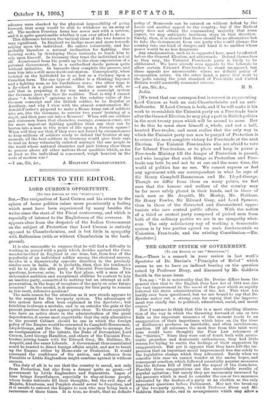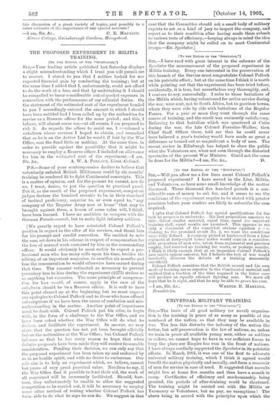[To THE EDITOR OF THE "SPECTATOR."]
Sin,—There is a remark in your review in last week's Spectator of Dr. Devine's "Principles of Relief" which seems to me to have an indirect bearing on the question raised by Professor Dicey, and discussed by Mr. Goldwin Smith in the same issue.
You say : "It is noteworthy that Dr. Devine differs from the general view that to the English Poor Law Act of 1834 was due the vast improvement in the moral of the poor which so rapidly followed the strict administration of the Act. This view has hardly ever been questioned, but we are bound to say that Dr. Devine makes out a strong case for saying that the improve- ment was chiefly due to political, educational, social, and moral causes."
Now I venture to think that this is a most startling illustra- tion of the way in which the thrusting forward of one or two Bills as the important measures of the moment tends to an exaggeration of their importance which later on (in the time of disillusion) produces an inevitable, and often mischievous, reaction. Of all reformers the most free from this taint were (one would have thought) the Poor Law reformers of the "thirties." Since they were out of touch both with aristo- cratic prejudice and democratic enthusiasms, they had little reason for trying to excite the feelings of their supporters by exaggerations. But yet it appears that they have left the im- pression that an important moral improvement was due solely to the legislative change which they advocated. Surely when we consider this case we cannot wonder at the undue hopes, and consequent reaction, which followed essentially popular measures like the Reform Bill of 1832 and the repeal of the Corn-laws. Possibly these exaggerations are the unavoidable results of popular agitation ; but surely they are enormously increased by the pressure which is used to consider the one or two measures advocated by the leaders of a party at an election as the only important questions before Parliament. May not the break-up of the two-party system, to which Professor Dicey and Mr. Goldwin Smith refer, end in arrangements which may allow a
—I am, Sir, &c., C. E. MAURICE.















































 Previous page
Previous page